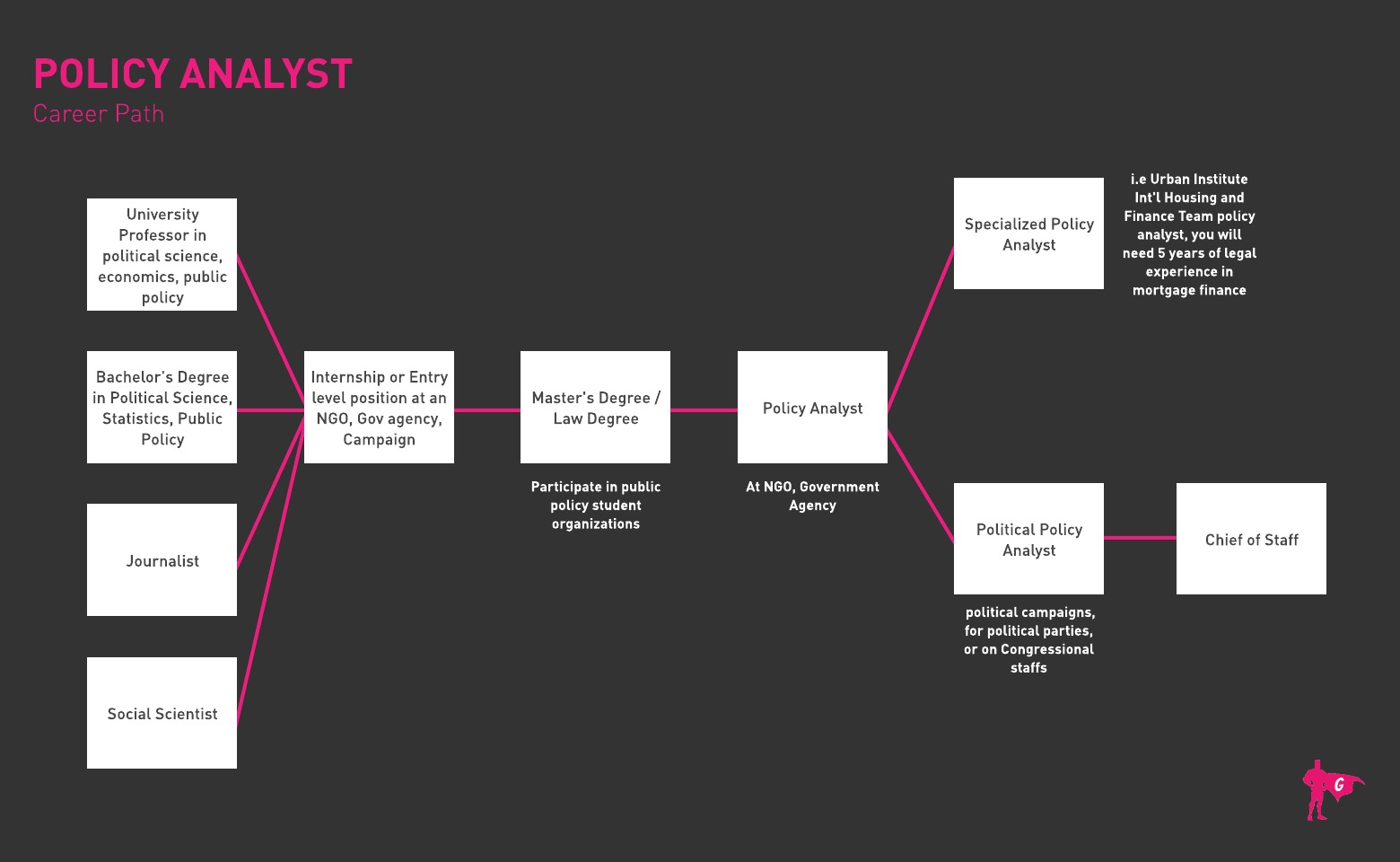Spotlights
Policy Advisor, Policy Specialist, Legislative Analyst, Public Policy Analyst, Research Analyst, Government Affairs Analyst, Policy Researcher, Policy Consultant, Policy Planner, Policy Strategist, Sociologist
A Policy Analyst is someone who helps craft public policy and laws at several levels of government. They value working together to find the best policy possible to solve a public problem.
Professionals in this position can come from several different backgrounds, including education, law, sociology, and city planning. Their position may be formalized within a government department, or they may be part of an independent corporate “Think Tank.” They may also be part of a temporary group formed to solve a problem.
This position is responsible for the final written policies that can become laws or legal procedures. They do this through analyzing collected data from the public, as well as using previous knowledge to help solve problems.
- Participating in the legislative process.
- Providing input into public policies that can impact millions of people.\
- Being able to put their individual passions into practice.
- Being seen as a leader in the area of focus.
Regardless of whether in the private or public sector, policy analysts work in much the same way. Much of their work is in an office setting, but may require extra hours when close to deadlines. If they are working in a public capacity, they will need to be able to communicate across party lines to help find politicians willing to work together so the policy change can happen.
Much of their day to day will involve:
- Analyzing collected data in the form of surveys or interviews with citizenry.
- Review how previous legislation has impacted particular members of a population and the negative or positive impacts the legislation may have had.
- Meet with other analysts, legislators, or stakeholders to identify problems and workable solutions.
- Collaborate on written reports based on the information gathered, so they can communicate the best course of action to solve a problem.
Soft Skills
- Analytical skills to identify trends
- Strong oral and written communication skills
- Problem Solving and Critical Thinking
- Able to collaborate and work with different opinions.
- Strong research and planning skills.
Technical Skills
- Dependent on the level and area, strong database and data analysis skills, including various computer software dedicated to these.
- Word processing, email, and technical communication.
- Knowledge of research databases such as LEXISnexis.
- Federal Government (Or State/Local)
- Professional/Scientific Organizations
- Educational Organizations
- Grant-making
- Religious or non-profit organization.
While policy analysts can be hired directly from their undergrad programs, most hold a master’s degree in a specific field. It is rare to be hired directly into the policy analyst level. You will need to build experience and a strong network through governmental entry level positions.
This field has long, irregular hours, and can involve travel. It can take up a lot of personal time to reach a high level and be able to make positive change. Personal relationships will need to take a back seat while you move up in the industry.
As the political world grows further increasingly polarized, it has become harder for Policy Analysts to find opposing politicians willing to work together to make positive change. There has also been an incredible increase in data available about public policies – both in citizens affecting events and events affecting citizens. This data is both individual, as well as available video of events and independent state opinions.
Participate in student government.
Create their own games.
Participate in Debate/Forensics
- Per the Bureau of Labor Statistics, many Policy Analysts have graduate degrees in law, education, or business administration. They tend to work in policy areas related to their major or specialization
- Common areas of focus include economics, healthcare, public policy, and political science
- Popular degree options include a Master of Public Administration, Master of Public Policy, and Master of Public Affairs
- Most individuals who find work as policy analysts do so after completing a Master’s in Public Administration.
- While most Policy Analysts hold a master’s or PhD, some earn their reputation as freelance experts before being picked up to work in think tanks. Many augment their academic experiences as Policy analyst interns
- English, writing, legal research, and fact-checking are all required topics to master
- Stock up on courses like English, writing, speech, history, psychology, sociology, and politics
- Think about the area you want to work in and start reading up on current policies, criticisms, and areas for improvement or reform
- Participate in online and in-person social forums to see what types of issues average Americans are talking about
- Check out Quora’s “What is one policy you would change in the U.S. & why?”
- Get involved with debate club and student government in high school to hone relevant skills
- In college, join (for form) active student organizations devoted to particular policy topics. Drive campus interest through public lectures, debates, or events
- Consume news from a variety of sources to discover how stories may be told from differing perspectives. Don’t discard a source simply because you don’t necessarily agree with it
- Form your own opinions on issues, based on all the facts from reliable sources. Policy Analysts need to generate original ideas and solutions
- Learn how to leverage social media to spread information and raise awareness
- Publish articles and op-eds on websites, papers, magazines, or LinkedIn regarding policy topics
- Apply for internships and volunteer at local nonprofits advocating for causes that interest you
- Professionally engage with working Policy Analysts. Ask questions, challenge assumptions, and make your case in an objective, goal-oriented manner
- Develop the habit of thinking critically about issues. Consider if you have a personal bias. Try to put yourself in the shoes of someone who may think differently, to gain perspective
- Be open to criticism and feedback. Learn how to listen respectfully to the opinions of others
- Learn the value of negotiation and compromise. Recognize when a policy you favor may be flawed or in need of change

- Similar to other positions in the public sector, policy analysts find their career through strong networking and taking advantage of available opportunities. During your school career, take advantage of government internships or similar opportunities and stay in touch with the individuals you meet during these positions. If you were able to impress them with your work, they can help refer you to entry level positions.
- While you may be able to find an entry level analyst position, you will typically need to work for a few years gaining experience and further building your network. During this time, some people take the time to work on their Master’s. Even without an MPA, you may be able to move into the analyst position. It is a combination of hard work, luck, and strong connections that can help you get this role.
- Check out job postings on Indeed, USAJobs.gov, and other job portals. Some jobs may be listed under different titles, such as “program analyst, program specialist, social scientist, policy coordinator, or management and policy analyst”
Websites
- Association for Public Policy Analysis and Management
- CIA World Factbook
- Citation Guide
- Code of Federal Regulations
- Congress.gov
- Congressional Budget Office
- C-SPAN Economic Policy Institute
- Executive Orders
- Federal Register
- Glossary of Legislative Terms
- Government Accountability Office
- Government Publishing Office
- Govinfo
- Library of Congress
- National Conference of State Legislatures
- Presidential Libraries
- Supreme Court
- The Legislative Process: Executive Business in the Senate
- Treaty Documents
- U.S. States and Territories – Guide to Law Online
- United Nations - International Law
- USAgov Data and Statistics
- White House
- World Association of NGOs
Books
- An Introduction to the Policy Process, by Thomas A. Birkland
- How Change Happens - Or Doesn't: The Politics of US Public Policy, by Elaine C. Kamarck
- Policy Analysis: Concepts and Practice, by David Weimer and Aidan Vining
- Policy Analysis as Problem Solving: A Flexible and Evidence-Based Framework, by Rachel Meltzer and Alex Schwartz
- The Lobbying and Advocacy Handbook for Nonprofit Organizations: Shaping Public Policy at the State and Local Level, by Marcia Avner, Josh Wise, et al.
- Researcher (In a University)
- Senior Political Aide
- Administrative Services Manager
- Management Director
- Executive Leader
- Regional/City Planner
Becoming a policy analyst is a long road. At the end, however, you will have the opportunity to create real change for your community or the country at large. If you are a person who enjoys solving problems with data and working with a variety people, it may be a good career choice.
Newsfeed

Featured Jobs

Online Courses and Tools








